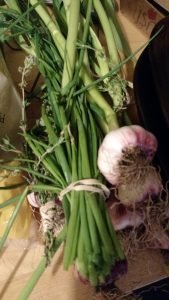 To feel the sun on a warm spring day and taste its rays imbued in the fresh green things that grow on the land is the essence of life, but one that is oft forgotten.
To feel the sun on a warm spring day and taste its rays imbued in the fresh green things that grow on the land is the essence of life, but one that is oft forgotten.
I am a big believer in local food security and local food systems. I dedicate my free time and energy to participating in localized food economies and processes that support small businesses. I strive to support other small businesses, that we may have a thriving community made up of people engaged in providing the goods and services that we need.
The industrial system has outsourced production of most consumer goods, and the ownership of the means of production is not controlled by smallholders who live in rural economies. In an age of decreasing opportunities for meaningful employment, there are some industries that should not be governed by industrial-complex policies. Food production and knowledge transmission should be defined by qualitative, not quantitative indexes. The question we should be asking about our food is “how good is it?” When we ask this question, we should be referring to the properties of which the food consists, but also to the methodologies by which those properties came to be synthesized for our consumption.
What is the condition of the land on which the food was grown? Is it thriving or declining? Is it being stewarded with an eye towards sequestering carbon or is it blindly producing it? What are the true costs of our food purchases; where and by whom are those costs borne? There are many questions that we can ask, and the answers should guide our choices and purchases.
Food work isn’t easy, and neither are efforts to create justice within food systems. In a nation of subsidized agribusiness, food policy becomes a tool that is weaponized against operations that do not produce large quantities of standard commodity crops.
There is an honor that comes with food production and preparation. To provide and prepare food for people is to participate in a fundamental connection and contract, but one which we devalue and ignore in our modern, compartmentalized society. It is important to me to know where my food came from as much as possible; to pay homage to the social contract that is engendered by the nourishment I take into my body to sustain life.
It is easy to pine for a forgotten past that may or may not have ever existed; we all remember “the good old days”, but the undeniable reality in which we find ourselves is one that encourages total dissociation from knowledge of origin around the things we consume. We are taught that “an egg is an egg is an egg”. Nothing could be further from the truth; discovery of truth-of-place changes the perception of the individual like waking up from the Matrix.
The divorcing of individuals from the deep social contracts integral to traditional communities has its roots long ago in the division of labor that made possible the rise of civilizations. As humans became less aware and connected to the sources of food and medicine plants that sustained us, we began to lost the vitality of place. We exchanged unique representations for homogenous, reproducible experiences that are paved over the top of tradition, culture and landscape. A fundamental impoverishment of soul and spirit occurs as we lose our connection with the land. There are concrete, simple steps that we can take in the right direction. We must support farmers and makers, using our dollars and our energetic exchanges to define community in the image we wish to see. It is up to us.
